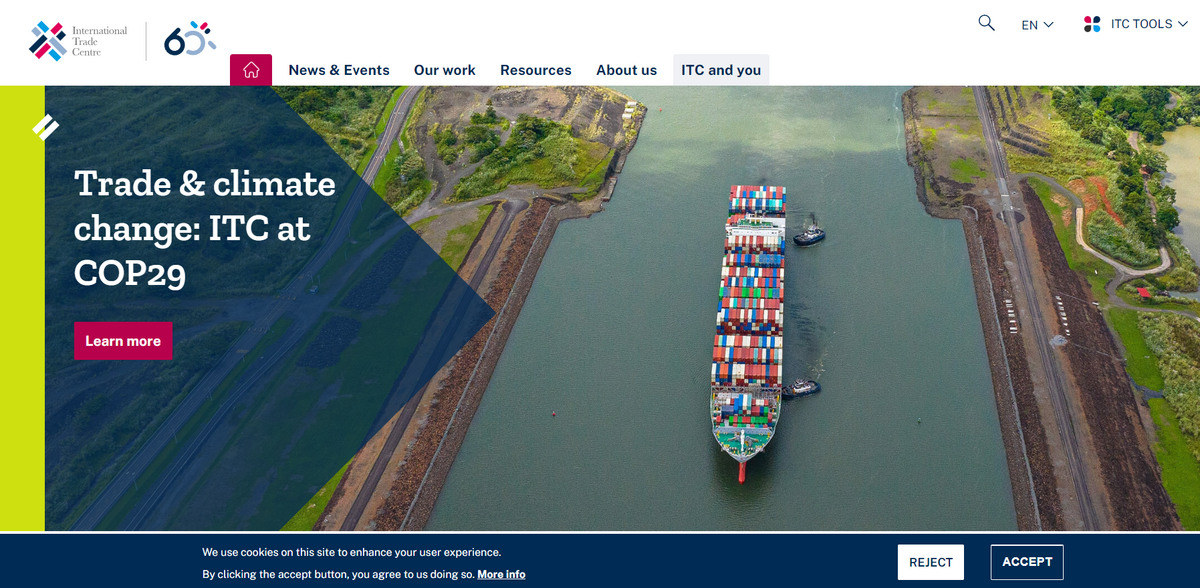What the Project Is About
ITC provides a wealth of information and resources on trade for businesses in developing countries. The tools below – some of them joint projects with other organisations such as the WTO, UNCTAD, and World Bank Group – are intended to explore and facilitate trade with other countries… ITC’s work is demand-driven and client-oriented, meaning that tailored support is provided in line with national objectives. This approach fuels the growth of trade opportunities for client micro, small, and medium-sized businesses (MSMEs), business support organizations, and policymakers in developing and least-developed countries. Every word in this project description reinforces a commitment to improving trade competitiveness while reducing poverty and strengthening economies.
Main Benefits
The approach offers several key benefits:
- Tailored support aligned with national objectives
- Enhanced trade competitiveness and growth opportunities
- Reduction in poverty and economic strengthening
- Collaboration with international organisations (WTO, UNCTAD, World Bank Group)
- Delivery of customised engagement strategies for funders and partners
These benefits are coupled with an intensive focus on key developmental impact areas—making clear that every intervention is designed to serve the needs of developing and least-developed regions.
Expanding Trade Opportunities
The project is built on consistent messaging: to explore opportunities and bring together various stakeholders who share common goals of increased prosperity, inclusiveness, and sustainability. Partners engage in a dynamic and sometimes unpredictable journey – one where opportunities in emerging global markets are uncovered, and strategic approaches are employed to harness these market potentials. ITC’s work is a demonstration of a commitment to exploring trade in a broad and detailed manner, where every tool is precisely aimed at opening new avenues for business growth and collaboration.
Global Engagement and Partnerships
It is essential to note that the work of ITC extends beyond borders, engaging with funders and partners around the world. The strategy is built on customized engagement strategies based on complementary expertise and common value propositions. In a world that increasingly values multi-stakeholder collaboration, the project naturally thrives on partnerships that extend the reach of trade opportunities. These strategic collaborations have been crucial in the joint projects mentioned earlier – where organisations like the WTO and UNCTAD join forces with ITC to ensure that trade development is not limited by geographical or economic barriers.
Focus on Underrepresented Regions
Crucially, the project targets regions that have been historically neglected. This encompasses Least Developed Countries, Landlocked Developing Countries, Small Island Developing States, Sub-Saharan Africa, as well as post-conflict and fragile states. By placing project implementation in these regions as a priority, the intervention is very much aligned with the broader vision of a globally inclusive trade ecosystem… The deliberate focus on these geographies ensures that real impact reaches those who need it most.
Project Impact on Sustainable Development Goals
- Goal 1: No Poverty – reducing poverty through improved trade competitiveness
- Goal 8: Decent Work and Economic Growth – supporting MSMEs and local businesses
- Goal 10: Reduced Inequalities – ensuring inclusive development across regions
- Goal 17: Partnerships for the Goals – fostering global collaboration and customised engagement strategies
Sustainable Future through Trade
By linking programmes and projects worldwide to the Sustainable Development Goals, ITC’s intervention aims to bring about a more equitable world through trade. The content consistently reflects a purpose-driven approach where technical expertise in four core services is blended with specific tools and approaches to achieve maximum impact. Client groups – whether they are micro, small, or medium-sized enterprises, business support organisations, or policymakers – are empowered by the resources and customised support available. The project emphasizes that trade is not solely about transactions; it is about building bridges, strengthening economies, and generating positive social change. In essence, every collaboration and initiative is designed to build a sustainable future, one where the challenges of poverty and inequality are met with innovative solutions and purposeful trade facilitation.


















